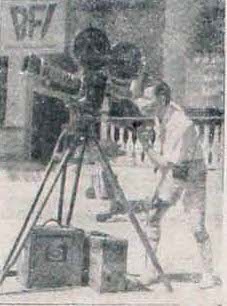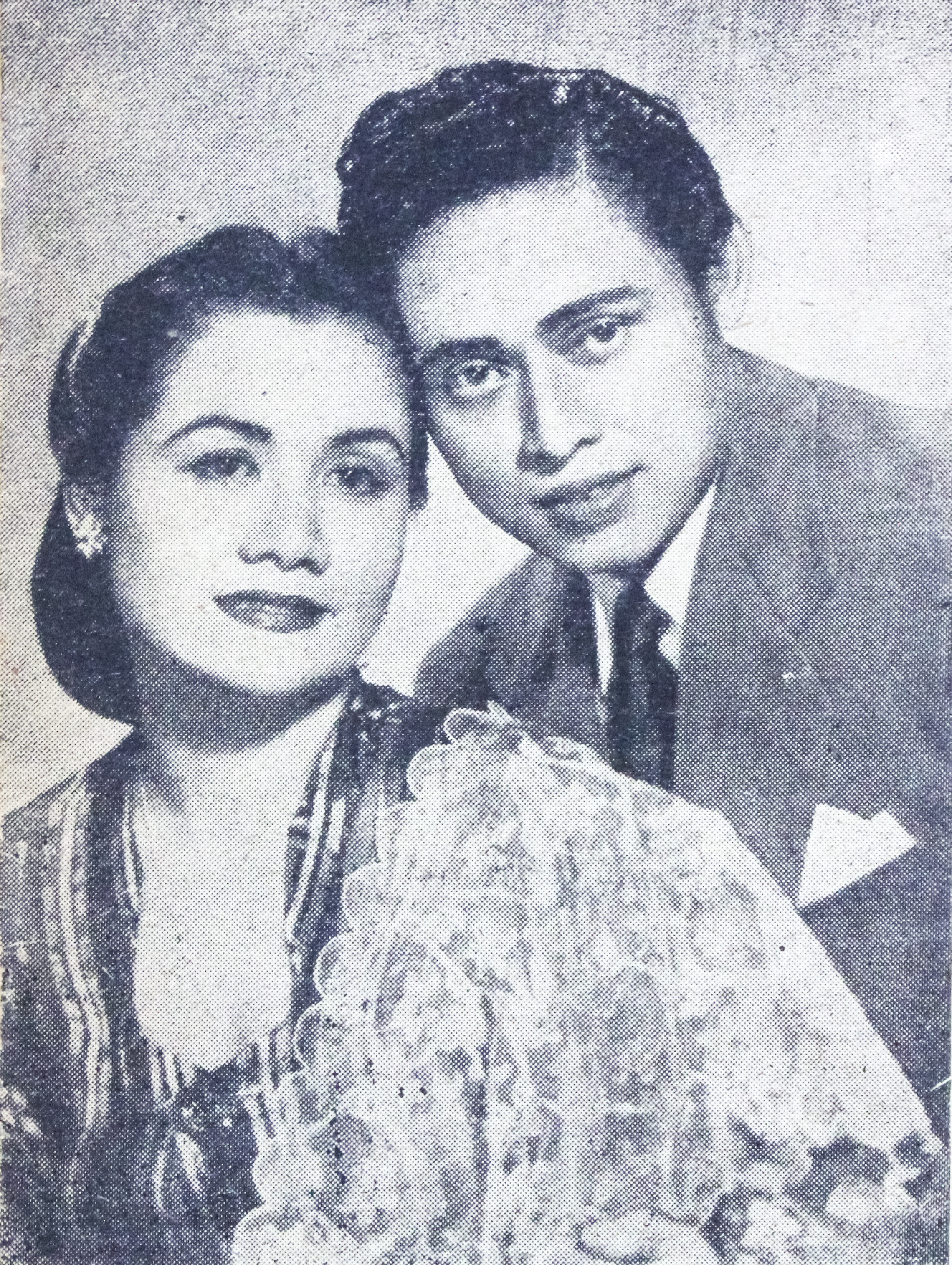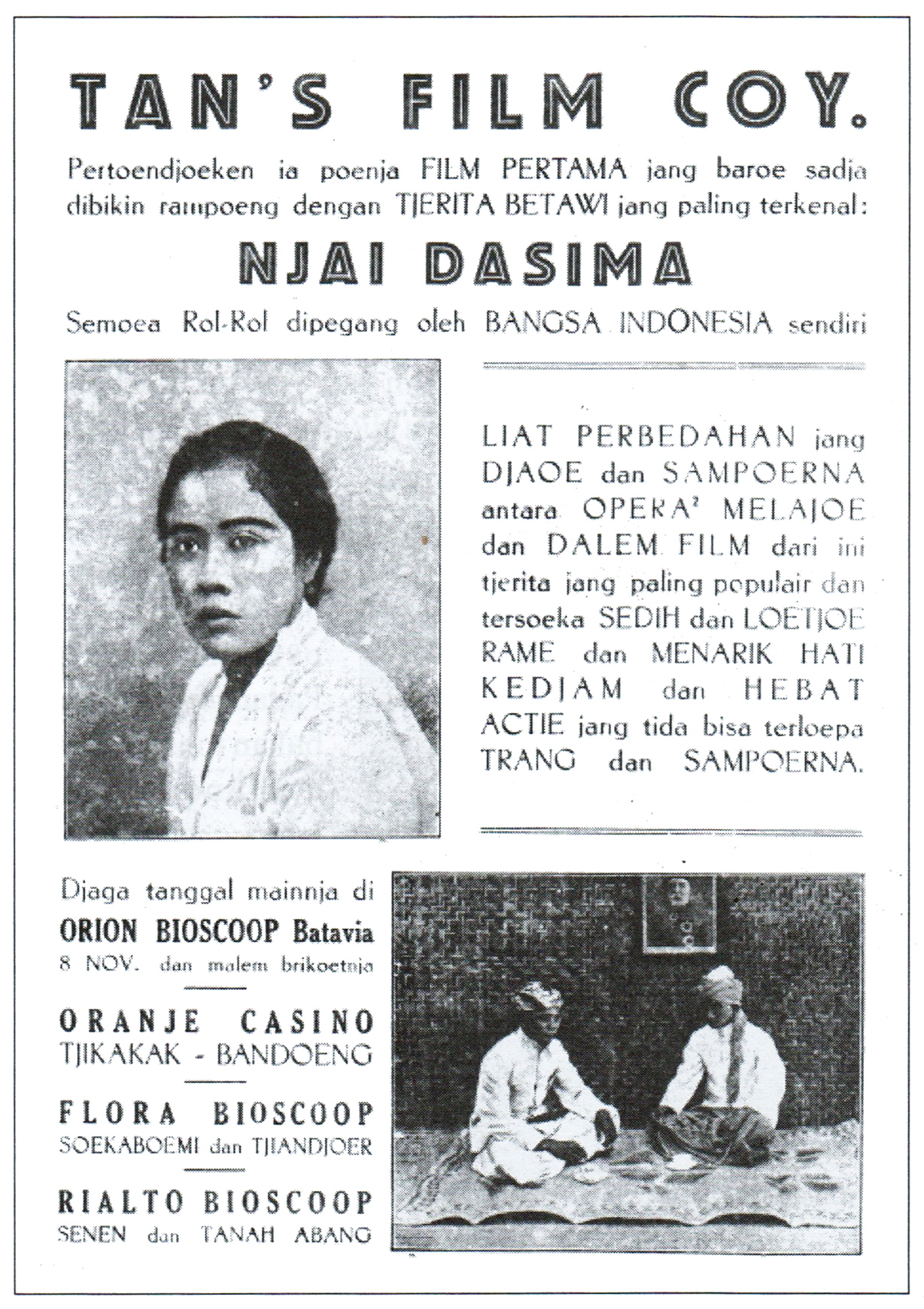|
Roekiah
Roekiah ( Perfected Spelling: Rukiah; 31 December 1917 – 2 September 1945), often credited as Miss Roekiah, was an Indonesian ''kroncong'' singer and film actress. The daughter of two stage performers, she began her career at the age of seven; by 1932 she had become well known in Batavia, Dutch East Indies (now Jakarta, Indonesia), as a singer and stage actress. Around this time she met Kartolo, whom she married in 1934. The two acted in the 1937 hit film '' Terang Boelan'', in which Roekiah and Rd Mochtar played young lovers. After the film's commercial success, Roekiah, Kartolo, and most of the cast and crew of ''Terang Boelan'' were signed to Tan's Film, first appearing for the company in their 1938 production ''Fatima''. They acted together in two more films before Mochtar left the company in 1940; through these films, Roekiah and Mochtar became the colony's first on-screen couple. Mochtar's replacement, Rd Djoemala, acted with Roekiah in four films, although thes ... [...More Info...] [...Related Items...] OR: [Wikipedia] [Google] [Baidu] |
Kartolo
Raden Mas Kartolo (before 1918 – 18 January 1949) was an Indonesian actor and songwriter. Born in Yogyakarta to a noble family, he entered the theatre and married the actress Roekiah around 1933. The two, living in Batavia (now Jakarta) acted in numerous movies together, starting with the 1938 hit '' Terang Boelan''. However, Roekiah was always cast with other actors as her romantic interest. After Roekiah died in 1945, Kartolo brought the family to Yogyakarta and worked with Radio Republik Indonesia until his death. One of his sons, Rachmat Kartolo, went on to be an actor in the 1960s and 1970s. Early life and career Kartolo was born in Yogyakarta, Dutch East Indies (now Indonesia), to a family of priyayi, noble descent. Around 1933, while a member of the Palestina touring troupe, he met his future wife Roekiah, a stage actress and singer of ''keroncong'' music (traditional music with Portuguese colonialism in Indonesia, Portuguese influences) in the Batavia (modern-day Jak ... [...More Info...] [...Related Items...] OR: [Wikipedia] [Google] [Baidu] |
Djoemala
Ismail Djoemala (also credited Rd Djoemala; Perfected Spelling: Ismail Jumala; 1915/18 – 10 June 1992) was an Indonesian actor active in the 1940s. He was often cast alongside Roekiah as her romantic interest. Biography Djoemala was born in Batavia (now Jakarta, Indonesia), the capital city of the Dutch East Indies. Sources disagree on his year of birth; the catalogue ''Apa Siapa Film Indonesia'' gives 19 September 1915, while Indonesian film historian Misbach Yusa Biran gives 1918. Although later billed as "Raden" Djoemala, the actor was not of noble descent. He had some schooling, completing his junior high school in 1934. A tailor by trade, Djoemala had owned the Broadway Store located on Kramat Raya Street. In 1940 he was approached by Tan's Film and cast for their new production, ''Sorga Ka Toedjoe'' (''Seventh Heaven''). He was cast opposite Tan's mainstay Roekiah, whose regular on-screen partner, Rd Mochtar, had recently left the company owing to wage concerns. Djoe ... [...More Info...] [...Related Items...] OR: [Wikipedia] [Google] [Baidu] |
Terang Boelan
''Terang Boelan'' (; Indonesian for "Full Moon", ''Terang Bulan'' in the Perfected Spelling System) is a 1937 film from the Dutch East Indies (now Indonesia). Written by Saeroen, directed by Albert Balink, and starring Rd Mochtar, Roekiah and Eddie T. Effendi, ''Terang Boelan'' follows two lovers who elope after one is almost forced to marry an opium smuggler. The film was shot in the Indies and Singapore, and was partially inspired by the 1936 Hollywood film ''The Jungle Princess''. It was aimed at native audiences and included ''keroncong'' music, which was popular at the time, and several actors from Balink's previous work '' Pareh'' (1936). ''Terang Boelan'' was a commercial success in both the Indies and abroad, earning 200,000 Straits dollars in British Malaya. This success revived the faltering domestic film industry and inspired films aimed at Malay audiences in Malaya, creating a formula of songs, beautiful scenery and romance that was followed for decades afterwar ... [...More Info...] [...Related Items...] OR: [Wikipedia] [Google] [Baidu] |
Lief Java
Lief Java (literally "Sweet Java") was an orchestra in the Dutch East Indies (now Indonesia). It was one of the first ''keroncong'' groups in the colony. Members Various musicians are recorded as having been part of the Lief Java orchestra. This includes Ismail Marzuki, a singer-cum-songwriter known for his nationalist works; the blind singer Annie Landouw; and the theatrically-trained husband and wife team Kartolo and Roekiah. Other members included Hugo Dumas, Atjep, and Miss Netty. History Lief Java was established in 1918 by Soewardi as the Rukun Anggawe Santoso Orchestra before changing its name to Lief Java in 1923. The orchestra used a variety of instruments, including cellos, flutes, guitars, and violins. Most of the artists were amateurs, with little previous experience. The orchestra practiced in Kampung Kepuh, Kemayoran, Batavia (now Jakarta), in the home of musician S. Abdullah, and played a variety of songs, both originals and arrangements or adaptations. The compa ... [...More Info...] [...Related Items...] OR: [Wikipedia] [Google] [Baidu] |
Rachmat Kartolo
Rachmat Kartolo (13 March 1938 – 18 September 2001) was an Indonesian actor and singer. Early life Rachmat Kartolo was one of five children born to Kartolo and Roekiah, two film actors active with Tan's Film, on 13 March 1938. After Roekiah's death, Kartolo brought the children to his hometown at Yogyakarta. In the city, the Indonesian capital during the later days of the Indonesian National Revolution, Rachmat lost one of his siblings and, in 1949, his father. After the Dutch recognised Indonesia's independence, Rachmat and his surviving siblings – Jusuf, Imam, and Sri Wahjuni – were brought to Jakarta and raised by their father's friend, Adikarso. There Rachmat completed his education, graduating from senior high school before entering the National Theatre Academy of Indonesia. Career Adikarso introduced Rachmat to music and the recording industry; Rachmat and his brothers performed at Wisma Nusantara in Harmoni, Jakarta, under their guardian's supervision. In ... [...More Info...] [...Related Items...] OR: [Wikipedia] [Google] [Baidu] |
Sundanese People
The Sunda or Sundanese ( id, Orang Sunda; su, ᮅᮛᮀ ᮞᮥᮔ᮪ᮓ, Urang Sunda) are an indigenous ethnic group native to the western region of Java island in Indonesia, primarily West Java. They number approximately 42 million and form Indonesia's second most populous ethnic group. They speak the Sundanese language, which is part of the Austronesian languages. The western third of the island of Java, namely the provinces of West Java, Banten, and Jakarta, as well as the westernmost part of Central Java, is called by the Sundanese people ''Tatar Sunda'' or ''Pasundan'' (meaning Sundanese land). Sundanese migrants can also be found in Lampung and South Sumatra, and to a lesser extent in Central Java and East Java. The Sundanese people can also be found on several other islands in Indonesia such as Sumatra, Kalimantan, Sulawesi, Bali and Papua. Origins Migration theories The Sundanese are of Austronesian origins and are thought to have originated in Taiwan. T ... [...More Info...] [...Related Items...] OR: [Wikipedia] [Google] [Baidu] |
Rd Mochtar
Hajji Raden Mochtar (born 1918), often credited as Rd Mochtar, was an Indonesian actor. Of noble descent, Mochtar was discovered by Albert Balink and first cast in the commercial failure '' Pareh'' (1936). Rising to popularity after the release of ''Terang Boelan'' the following year, he spent nearly sixty years in film, while also becoming a businessman and farmer. Childhood and early career Mochtar was born in Cianjur, West Java, in 1918. He was a Javanese of ''priyayi'' (noble) descent. He did his elementary school studies at a Taman Siswa school in Bandung. In 1935 Mochtar was cast in the leading role of Mahmud in Albert Balink's film '' Pareh''. Balink was out with coffee with Joshua and Othniel Wong and saw Mochtar, whom he considered tall, strong, and handsome, driving by. Balink and the Wongs chased Mochtar in their car and caught him. For the film Mochtar was told to use the title ''Raden'', which he and his family had already abandoned. According to the Indonesian ... [...More Info...] [...Related Items...] OR: [Wikipedia] [Google] [Baidu] |
Tan's Film
Tan's Film was a film production house in the Dutch East Indies (modern Indonesia). Established by the brothers Tan Khoen Yauw and Tan Khoen Hian on September 1, 1929, its films were mostly targeted at native ethnic groups. Starting with '' Njai Dasima'' in 1929, the company released fifteen movies before ultimately being dissolved after the Japanese occupation. The Tans and the Wong brothers established Tan & Wong Bros in 1948 to continue this work. History First iteration Tan's Film Company was established by Tan Khoen Yauw and his brother Tan Khoen Hian on September 1, 1929. It was one of three studios established in the Dutch East Indies that year, together with Nansing Film Corporation and another Chinese-owned studio. Tan's established a large studio building on Defensielijn v.d. Bosch (now Bungur Besar Raya Street). It had several divisions, including costuming, filming, and decor. The Tans, who had been raised in Kwitang, Batavia (modern day Jakarta) and grown up ... [...More Info...] [...Related Items...] OR: [Wikipedia] [Google] [Baidu] |
Priyayi
''Priyayi'' (former spelling: ''Prijaji'') was the Dutch-era class of the nobles of the robe, as opposed to royal nobility or ''ningrat'' ( Javanese), in Java, Indonesia, the world's most populous island. ''Priyayi'' is a Javanese word originally denoting the descendants of the ''adipati'' or governors, the first of whom were appointed in the 17th century by the Sultan Agung of Mataram to administer the principalities he had conquered. Initially court officials in pre-colonial kingdoms, the ''priyayi'' moved into the colonial civil service and then on to administrators of the modern Indonesian republic. Pre-colonial period The Mataram Sultanate, an Islamic polity in south central Java that reached its peak in the 17th century, developed a ''kraton'' ("court") culture from which the Sultan emerged as a charismatic figure that rules over a relatively independent aristocracy. Named ''para yayi'' ("the king’s brothers"), nobles, officials, administrators, and chiefs were int ... [...More Info...] [...Related Items...] OR: [Wikipedia] [Google] [Baidu] |
Albert Balink
Albert Balink (3 August 1906 – 8 February 1976) was a Dutch journalist and filmmaker who contributed to early Indonesian cinema. Born in the Netherlands, he began a career in film journalism in the Dutch East Indies. A self-taught filmmaker, in the mid-1930s, he released a documentary and two feature films, before immigrating to the United States and resuming his journalistic career. Biography Balink was born in 's-Hertogenbosch, Netherlands. In the 1920s and early 1930s he was a reporter with ''De Locomotief'', a newspaper based in Semarang, Dutch East Indies, and the ''Soematra Post'', based in Medan. He wrote extensively about film while working at these papers. In 1934, Balink established the Java Pacific Film production company with the Wong brothers, headquartered in an old Bandoeng tapioca flour factory. Inexperienced with film, Balink had attained only theoretical knowledge gained from self-instruction. The company's first production was a documentary film, ''De ... [...More Info...] [...Related Items...] OR: [Wikipedia] [Google] [Baidu] |
Priyayi
''Priyayi'' (former spelling: ''Prijaji'') was the Dutch-era class of the nobles of the robe, as opposed to royal nobility or ''ningrat'' ( Javanese), in Java, Indonesia, the world's most populous island. ''Priyayi'' is a Javanese word originally denoting the descendants of the ''adipati'' or governors, the first of whom were appointed in the 17th century by the Sultan Agung of Mataram to administer the principalities he had conquered. Initially court officials in pre-colonial kingdoms, the ''priyayi'' moved into the colonial civil service and then on to administrators of the modern Indonesian republic. Pre-colonial period The Mataram Sultanate, an Islamic polity in south central Java that reached its peak in the 17th century, developed a ''kraton'' ("court") culture from which the Sultan emerged as a charismatic figure that rules over a relatively independent aristocracy. Named ''para yayi'' ("the king’s brothers"), nobles, officials, administrators, and chiefs were int ... [...More Info...] [...Related Items...] OR: [Wikipedia] [Google] [Baidu] |
%2C_cover.jpg)




